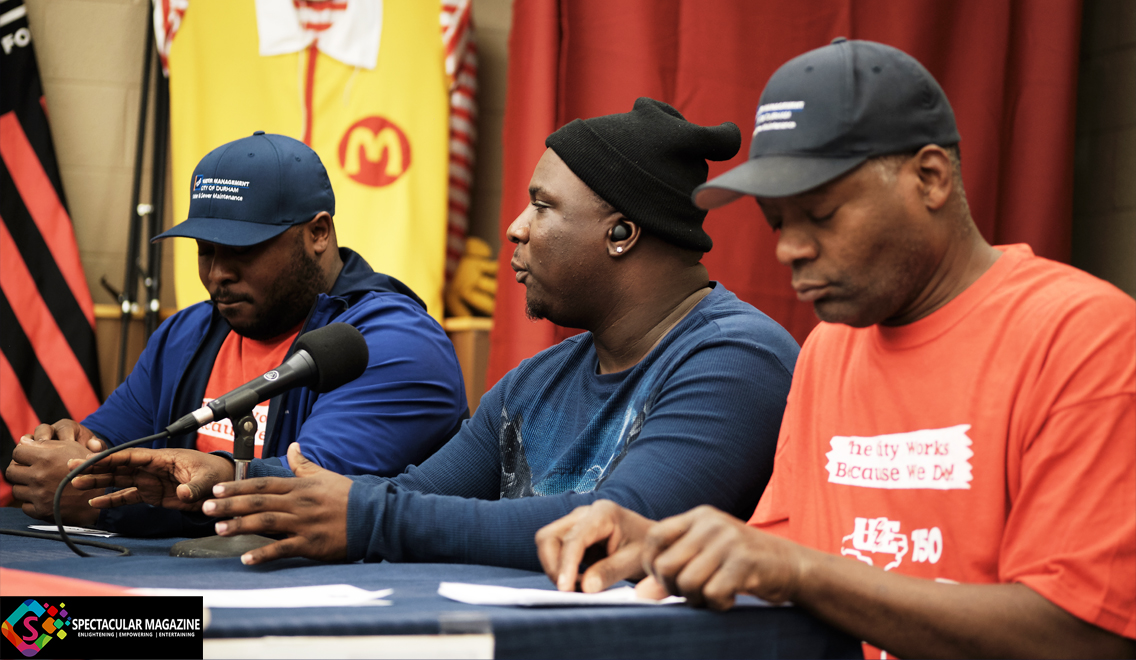Durham City Workers’ Union Demand End To Workplace Racism
Durham, NC – The historic Tobacco Workers Union Hall was packed on the evening of February 21st with over 80 people, about 30 of them city workers and a few elected officials, including two state reps, a city councilor, and the mayor.
“We’ve been struggling for years with racism and favoritism in the city’s discipline, hiring, firing, and promotion practices. It’s an incredibly toxic work environment,” said Marcus Cates.
City workers spoke out about workplace racism, chronic short staffing across all city departments, public health and safety concerns, and a new reclassification system that is turning up the pressure on workers to meet increasingly unrealistic expectations, or be punished. City workers have to work in dangerous weather conditions and sometimes on no sleep, as workers who do call duty are required to use their own vacation time to take a day off after working a 27-hour shift. The city has long neglected issues of racism in hiring, promotions, and discipline.


The union (UE150) is demanding that the city not accept the reclassification report until these issues are resolved. Fourteen workers articulated the union’s four structural changes that could resolve these issues: 1) a fair grievance process, 2) an end to arbitrary and racist hiring and promotional practices, 3) the replacement of the unfair merit pay system with a step plan that would treat the city workers as first responders, and reward them for their years of service to the city, and 4) full funding for full staffing, with an equation to account for the city’s growth.
“We’ve been struggling for years with racism and favoritism in the city’s discipline, hiring, firing, and promotion practices. It’s an incredibly toxic work environment,” said Marcus Cates. Cates, 34, has worked in the City’s Department of Water and Sewer for 14 years. “The restructuring is basically a speedup that puts more pressure on us and intensifies our other struggles. We got together and decided…enough is enough. We’re gonna make ourselves heard.”

Since March 2017, City Management has contracted with a private consultant to develop proposals to restructure the City’s employees and their job classifications. Over these two years, the City Workers’ Union has reached out to City Manager Tom Bonfield a number of times to discuss the restructuring process, but he has not met with union members. The City’s workers began to be notified of changes to their positions in December 2018, before the official report was submitted to City Council. City Management intends to put the report before the City Council for a decision in March.

“This is part of a coordinated statewide effort to increase efficiency at the cost of public workers’ well being,” said Donald Quick, a shop steward in the Department of Public Works. “We’re pushing for the City Councilors to actually address the concerns of workers in this reclassification, so we’re organizing ourselves around four resolutions: fair grievance processes and hiring practices, full staffing that accounts for the city’s growth, and a step plan for pay increases, instead of the arbitrary and racist systems we have today for pay, staffing, discipline and promotions.”
Raleigh and Charlotte went through a similar restructuring over the last two years, and in both cities the workers fought for and won a step plan similar to what police and firefighters already have in Durham. Workers in those cities know that they’ll receive a defined raise once every 2-3 years, and by the end of their career with the City they’ll be at the top of an established pay scale.
“It isn’t just about the money, though,” said Calinto Parker, water management crew chief with over 15 years working for the city. “We are fighting for respect, dignity, and decent working conditions, and we’re gonna keep raising our voices and raising public consciousness around these issues until the necessary changes have been made.”

